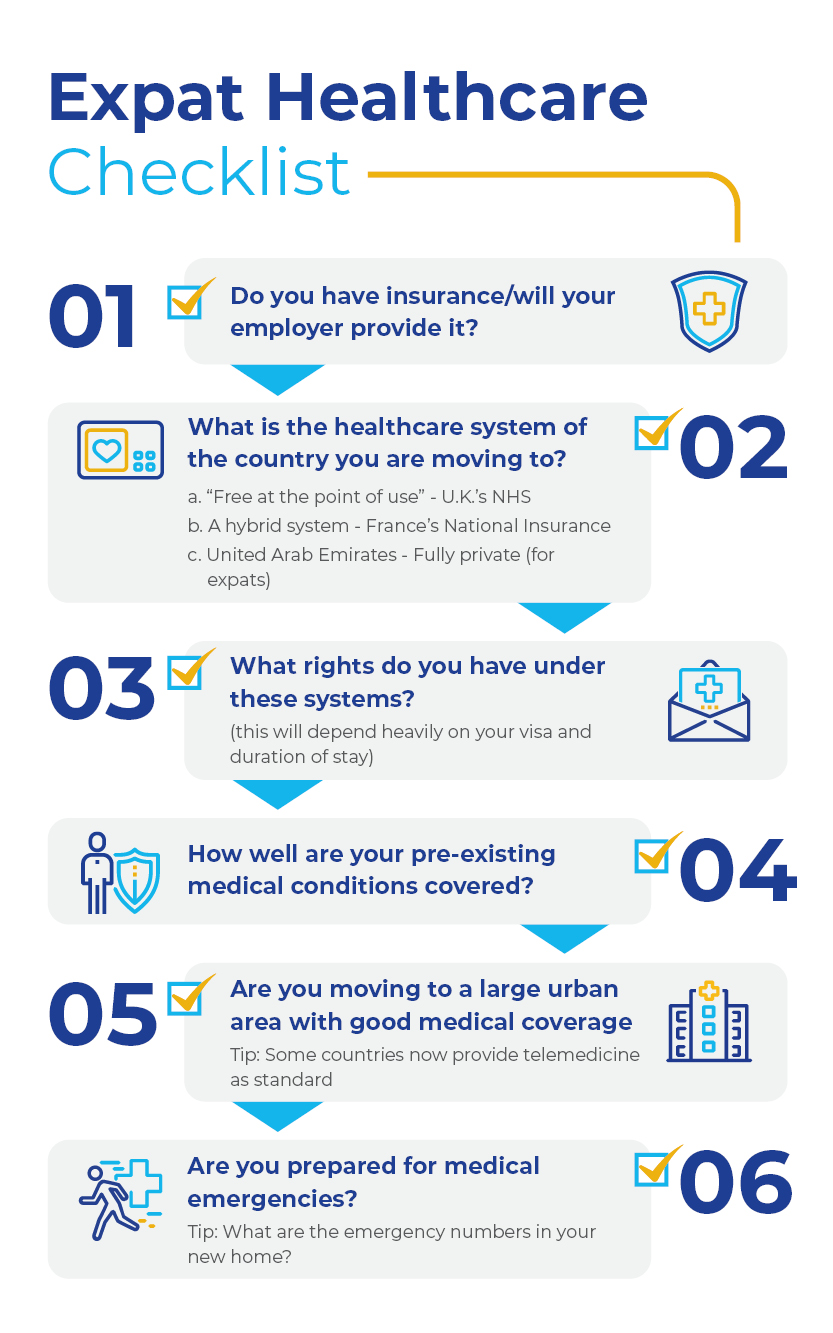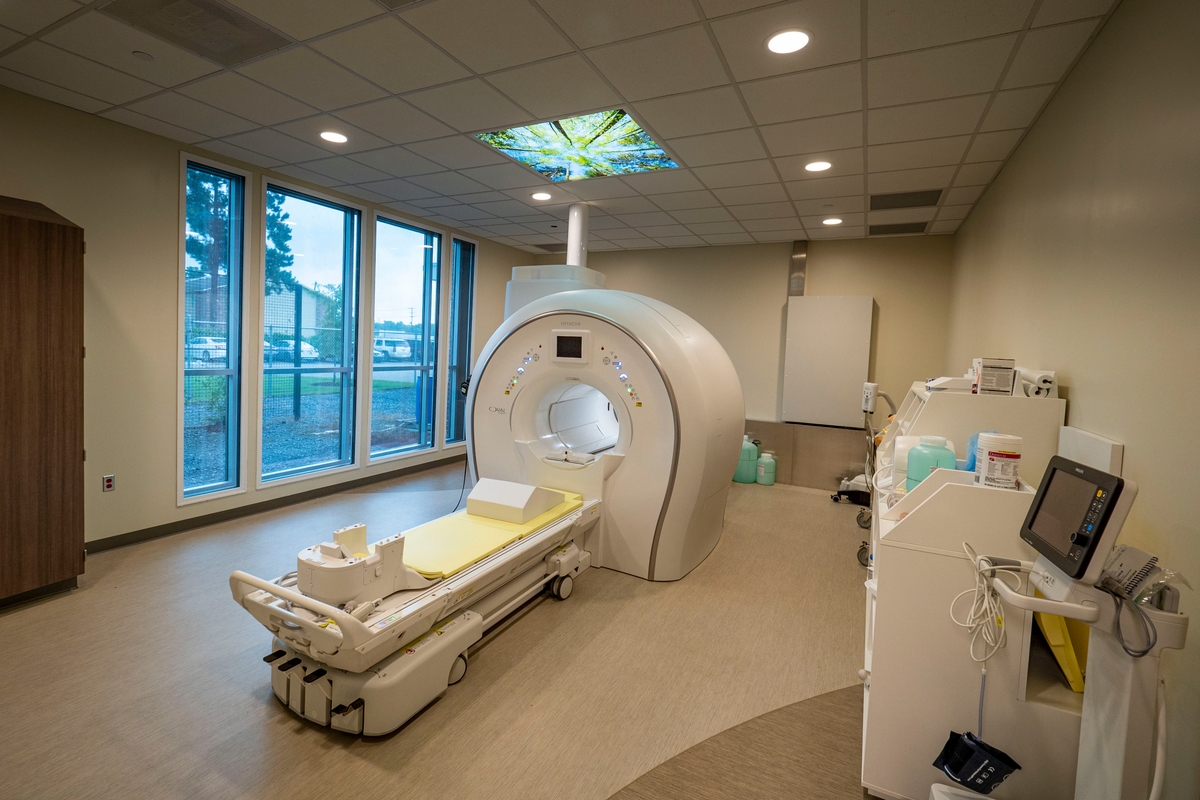Whether you're relocating for work or adventure, this guide offers a practical overview of what to expect and how to prepare for healthcare in your new home.
We’ll try and make sure the requirements and regional specifics are presented as simply as possible, and make sure you go knowing.
Health insurance is non-negotiable if you’re an expat, be that national or private. Some countries, like Germany, require proof of health insurance before granting a visa. However long your expat assignment, choosing a comprehensive policy that covers international care, emergency services, and pre-existing conditions is essential.
There are two main types of insurance expats should consider: local health insurance or an international policy.
Local insurance plans are generally tied to the country’s public healthcare system and may cover you only in that country. International insurance, on the other hand, provides coverage worldwide, ideal if you’re planning on traveling frequently while on assignment.
Many countries tie healthcare access to visa or residency requirements. For example, in Australia, expats must have health insurance to qualify for certain visa categories. So make sure you’re fully in the know, before you go.
1. Where are you going?
Healthcare systems vary significantly from country to country, and the way you access care as an expat may be different from what you're used to. We’ve provided a few examples below of popular expat destinations and the different ways in which these systems work, but a lot of this will depend on your personal circumstances. Has your employer, if any, guaranteed you overseas private health coverage for example? That will make things a lot easier!
We’ve tried to summarize things, but please make sure you delve into more detail when required as rules and regulations are changing all the time regarding something that can be seen as a bit of a political hot potato!
Britain's NHS: Free at the point of use?
In many countries, such as the U.K., healthcare is funded by the government, meaning residents (and often expats) can access essential services for free or at a reduced cost through systems like the NHS.
To qualify for free NHS services, you typically need to be classified as "ordinarily resident," meaning you are living in the U.K. on a lawful, settled basis.
Expats on certain long-term visas (such as work, family, or study visas lasting more than six months) are required to pay the Immigration Health Surcharge (IHS) when applying for their visa. The IHS grants access to the NHS just like a U.K. citizen.
France: a mixed healthcare system
France offers a mixed healthcare system, including both public and private care options. The French healthcare system, Sécurité Sociale, is partially funded by the government, and residents (including expats) can access public healthcare services for a relatively low cost.
If you’re living in France for more than three months you can apply to join the public healthcare system through Protection Universelle Maladie (PUMA). This allows them to receive reimbursement for medical treatments, often covering up to 70% of costs, while the rest may be covered by private insurance, known as “mutuelle.” The currency website Ibanista has an excellent rundown of how PUMA works, with specifics, here.

For certain specialist treatments, or faster service, many expats opt for private healthcare. Having private insurance is recommended to cover any gaps in public healthcare, especially for expats who may not immediately qualify for PUMA. Depending on your income and residency status, private insurance may also be required to cover specific treatments, like dental or optical care, which may not be fully reimbursed under the public system.
The United Arab Emirates (UAE): A fully private system
The healthcare system in the UAE for expats operates entirely on a private basis – although it provides public healthcare for Emirati nationals. You must rely on private health insurance to cover any medical needs. The UAE mandates that expats must have private health insurance, and in cities like Dubai and Abu Dhabi, employers are legally required to provide health insurance for their employees.
Make sure your insurance plan covers both emergency and non-emergency care, as the costs for medical services can be high. Unlike in countries with public healthcare systems, there is no subsidized option for non-citizens (outside of a few select cases like vulnerable people), making private insurance essential from the moment you arrive. For those who travel frequently or need specialized care, an international health insurance policy may be a better option, ensuring coverage both inside and outside the UAE.
Singapore: a blend of public and private
Singapore has a highly efficient healthcare system often ranking among the best in the world, offering a blend of public and private options. While the government heavily subsidizes healthcare for citizens and permanent residents through a tiered system, expats usually rely on private health insurance to access care. If you have an Employment Pass or another long-term visa, you can use public healthcare services but are not entitled to the same level of subsidies as Singaporean citizens or permanent residents.
2. Navigating local healthcare systems: what to expect
In many countries, the next step after relocating involves registering with the national system. For example, in Spain, expats need to obtain a local social security number to access public healthcare. Similarly, in countries like Canada, you’ll need to apply for a health card to benefit from the public system.
As mentioned, you might either prefer (or already have) private healthcare for faster access to specialists and services. You’ll also want to consider language barriers when accessing healthcare. In many cases, particularly in non-English-speaking countries, finding English-speaking doctors or specialists is critical. In major expat hubs like Singapore or Dubai, this may be easier, but in more rural areas or large non-English speaking countries such as Japan or China, language barriers could present a challenge.

3. Telemedicine and healthcare access in the digital age
For many expats (and indeed domestic patients), telemedicine has been a game-changer. Services like virtual consultations can provide access to healthcare when you're far from home. They can also help you navigate the aforementioned language difficulties of certain destinations.
Several telemedicine platforms, such as those provided by the Expatriate Group, cater to expats, providing international consultations that can address general health concerns or offer mental health support.
Within the context of public health systems, some countries, such as Singapore, have fully embraced telemedicine, offering both public and private services. This integration means you can access it as an expat as well.
4. Preparing for medical emergencies abroad
Knowing your local emergency number and nearest hospital is critical. Emergency numbers differ across countries, so make sure to familiarize yourself with the local protocols. For example, in most of the EU the emergency number is 112, while in the US it's 911 and in the U.K. it’s 999.
Additionally, some expats opt for medical evacuation coverage that allows them to be flown back to their home country for major procedures, but it should be noted this is fairly rare and, also, very expensive!
Have an emergency plan in place as well. Identify the nearest hospitals or medical centers that can handle emergencies, and ensure you have any necessary documentation or insurance information on hand.
5. Cultural considerations for healthcare overseas
In many parts of the world, traditional medicine plays a significant role alongside modern healthcare. China for example has a dual system where Traditional Chinese Medicine (TCM) is given as an option alongside conventional healthcare.
Understanding these practices can help you navigate the system more comfortably and respect cultural differences. Similarly, in countries like Japan, the formality of patient-doctor interactions may be different from what you’re used to.
In some cultures, there may be different attitudes toward preventative care, vaccinations, or even patient autonomy. Researching these norms before moving can help you better understand how to approach healthcare in your new country. One useful thing to remember is that what is obtainable Over the Counter (OTC) varies quite radically from country to country. Melatonin is easily obtainable in the U.S., but in the U.K. it requires a prescription from a sleep specialist.
It’s also important to consider vaccinations. Countries in tropical or subtropical areas, like Southeast Asia or Africa, may require vaccinations for diseases like yellow fever, typhoid, or malaria. Be sure to check vaccination requirements before traveling, as some countries may deny entry without proof.
We understand that relocating comes with stress. With a solid healthcare plan in place, you can focus on enjoying your new surroundings with peace of mind. Hopefully we’ve given you a good head start on getting ready for your move.
If you’re planning to relocate, contact our team for expert advice on healthcare options and other essentials for your move. We’ll help you go knowing!